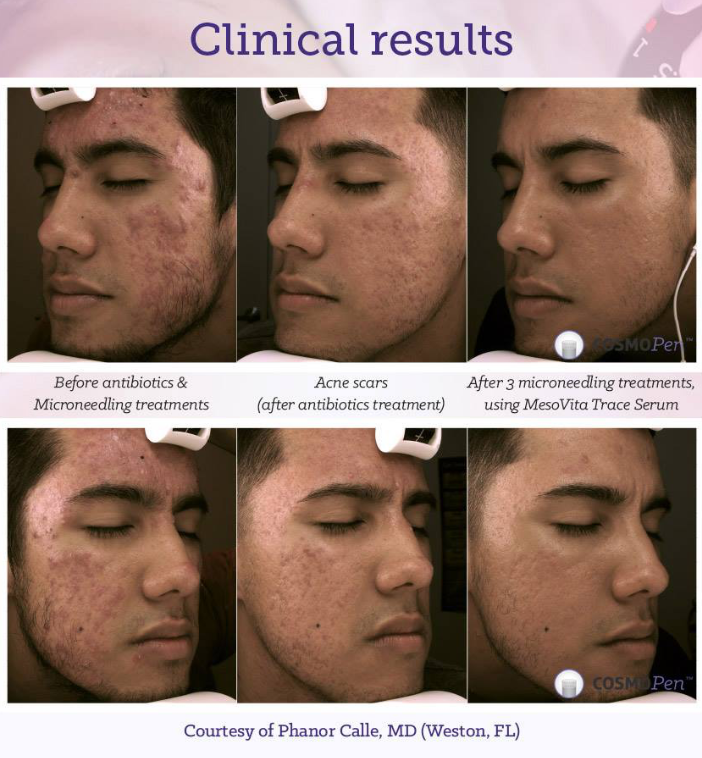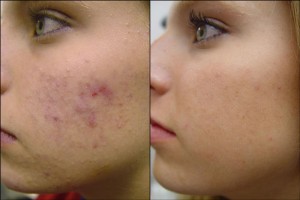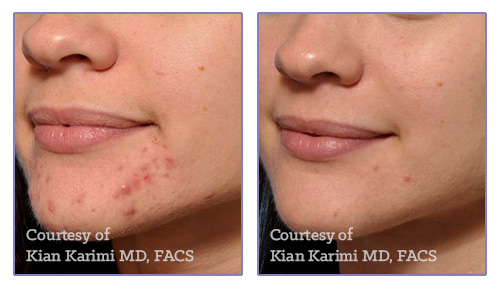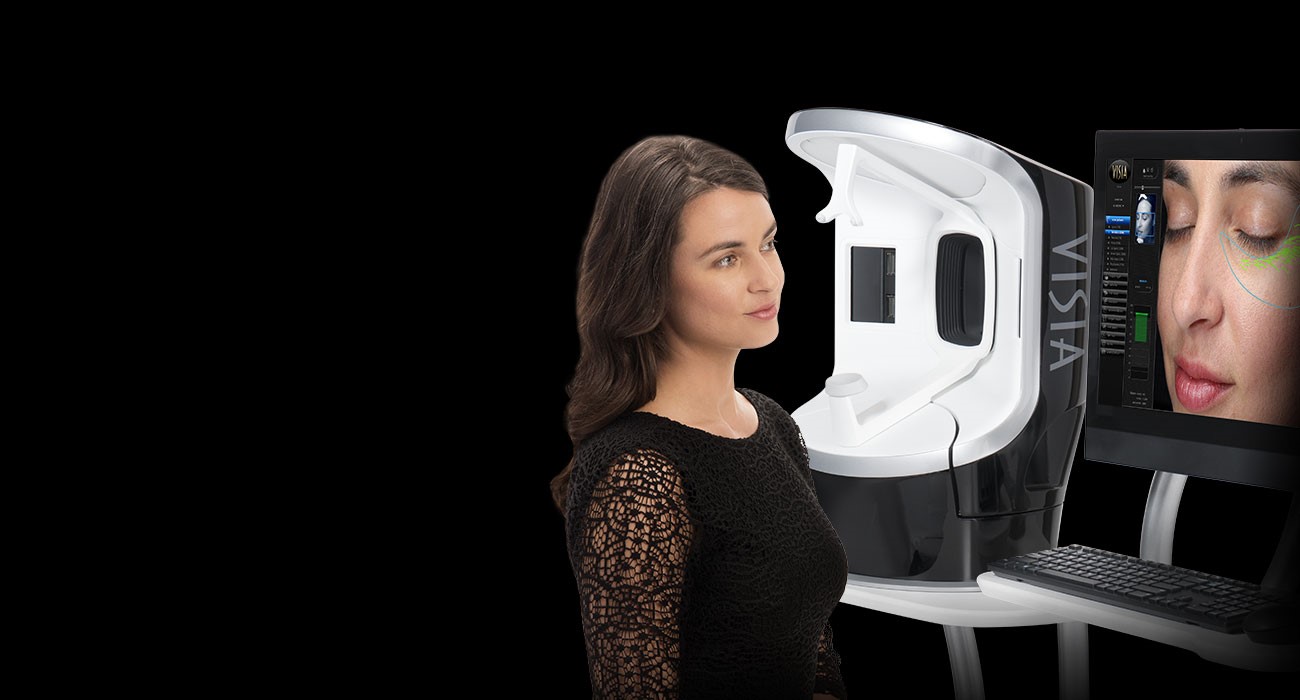What is Acne?
Acne treatment for all skin types that works!
Acne is a skin condition that causes blemishes like whiteheads, blackheads, papules, pustules (what many people call pimples), nodules, and cysts.
Skin acne occurs when pores on the surface of the skin become clogged.
Each pore opens to a follicle. A follicle contains hair and an oil gland. The oil released by the gland helps remove old skin cells and keeps your skin soft.

*Individual results may vary.
Acne treatment starts with understanding the underlying causes!
- When glands produce too much oil (lots of sebum), the pores can become blocked. Dirt, P. Acne bacteria, and dead skin cells build up together inside the pore. Inside the pore, the bacteria have a perfect environment for multiplying very quickly. With loads of bacteria inside, the pore becomes inflamed (red and swollen). If the inflammation goes deep into the skin, an acne cyst or nodule appears. The blockage is called a plug or comedone.
- If the top of the plug is white, it is called a whitehead; if it is dark, it is called a blackhead.
- Acne can cause cysts, scars, and hyper-pigmentations.
- If the plug breaks open, swelling and red bumps occur (papules, pustules, nodules).
Acne treatment focuses on targeting affected areas, age at presentation, and triggers!
Acne appears on the face, but it can appear on other areas of the body. For example, acne can appear on the back, chest, neck, shoulders, upper arms, and buttocks.
Acne is most common in teenagers, but anyone can get acne.
Hormonal changes may cause the skin to become more oily.
Acne tends to run in families, suggesting that some people may have a genetic predisposition to acne.
Adult acne can be particularly frustrating, and women are more susceptible. Acne can persist well into the 30s, 40s, and even 50s. Often causing deep-seated, tender, inflamed pimples and nodules, this type of acne is more common in women. Adult acne occurs even in those who have never had late-onset acne. For some women, acne becomes a problem during menopause. Persistent acne appears on the lower face, predominately around the mouth, on the chin, and along the jawline.
Acne treatment that worked so well during adolescence often is ineffective. Over-the-counter topical medications tend to irritate the skin, making acne worse. Some women try numerous treatments without success.
It may be triggered by:
- Impact of hormonal swings related to puberty, menstrual periods, pregnancy, menopause, and birth control pills.
- Some women get acne when they stop taking birth control pills. The pills may have been keeping their acne at bay.
- Greasy or oily products used on hair and skin: Some products such as oily sunscreens and hair greases promote a type of acne called acne cosmetica. When buying products to be used on the skin or hair, look for ones labeled “non-comedogenic” or “non-acnegenic” meaning less likely to cause acne.
- Certain drugs: Other drugs that may trigger acne are steroids, testosterone, estrogen, and anticonvulsants such as phenytoin. Birth control pills that contain estrogen and progestins may help control acne in women. When a birth control pill contains only progestins, it may make acne worse.
- Environmentally elevated levels of humidity and sweating.
- Stress: In response to stress, the body produces more androgens (a type of hormone). These hormones stimulate the oil glands and hair follicles in the skin. When over-stimulated, such as during times of stress, acne can flare.
- Family history of acne. In one study, researchers found that 50% of the adults with acne had a first-degree relative (parent, sibling, or child) who had acne, suggesting that some people may have a genetic predisposition.
Are you looking for an acne treatment near you? Dr. Phanor Calle offers a free consultation.


Individual results may vary. *
Research does not show that chocolate, nuts, and greasy foods cause acne. However, diets high in refined sugars may be related to acne.
Products alone will not solve your problem. It would help if you also had an acne expert’s guidance.
Your pores contain natural oil called sebum, which the acne bacteria feed on. An increase in hormonal activity and stress can cause an increase in sebum production, which can worsen your acne in two ways. First, it increases the number of clogged pores, creating a more significant food source for the bacteria.
Some foods, especially those high in iodides, such as salty foods, sushi, and some seafood, can irritate the follicle walls and worsen acne.
What if my skin is very sensitive?
We have patients with very sensitive skin. Therefore, we will only give you Acne treatments and skincare products you can tolerate.
Will my acne ever go away?
You will probably have to continue treating your acne to keep it under control for a while. It’s different for everyone, but some people need to continue treatment for years. Eventually, your pores will burn out, not produce as much sebum, and no longer have a habit of getting clogged, but no one knows when that happens.
Sometimes, I get an actual big pimple in a conspicuous place, and I feel that I’ve got to squeeze it to make it go away more quickly. Is that OK?
No. Every time you pick or squeeze your skin, you are spreading bacteria, infecting the lesion, and creating a permanent future scar. So, it is much more likely that instead of making it go away quicker, you will make it worse and last longer. For example, when you break the skin, it forms a scab, which causes a red mark that can last for months.
Acne treatment: Medical procedures may help clear skin
Medical procedures, such as Microneedling (CosmoPen) or chemical peels, may help clear stubborn acne and Acne Scars. Learn more about these acne treatments.
Acne treatments aren’t a one-size-fits-all commodity. So if prescription creams and antibiotics aren’t working for you — or if you can’t tolerate the side effects these medications can cause — you might consider acne treatments at Weston Medical Clinic & Cosmetic Center, Phanor Calle, MD.
Many office-based medical procedures are effective acne treatments for many people, from blue-light therapy to chemical peels.
Regardless of which acne treatments you use, try to keep your expectations realistic. You won’t start seeing improvements from most treatments for four to eight weeks, and your acne might worsen before it gets better.
Call us today and schedule a fee skin analysis with Dr. Phanor Calle Board-Certified Aesthetic Medicine Physician.
Visia complexion analysis redefines the Vision of Skin Care: faster image capture with automatic skin type classification, refined facial feature detection, and more.

VISIA® skin analysis starts with a digital photograph of your face, which Dr. Calle can use to document your skin condition and evaluate the effectiveness of the treatment options available to you. Then, the system generates comprehensive reports to add to your record and track your progress to a healthier, more youthful-looking complexion.
